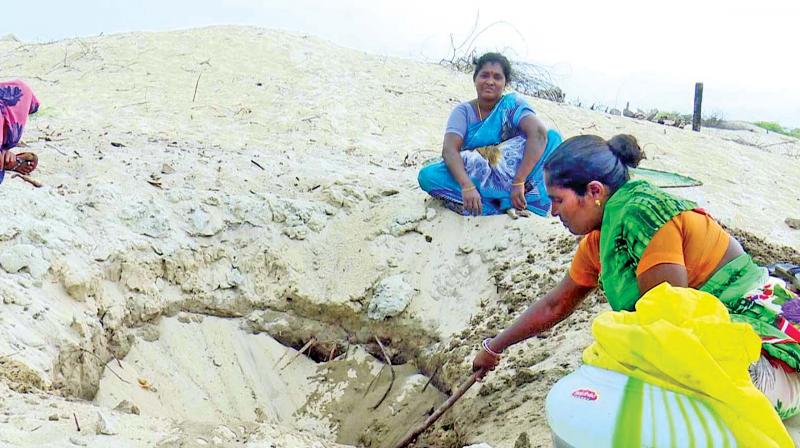Dhanushkodi woes: Water water everywhere, not a drop to drink

Rameswaram: The English romantic poet Samuel Taylor Coleridge’s famous lines, “Water, Water, Everywhere, Nor any drop to drink,” in his celebrated poem ‘Ancient Mariner’, could not be more true than in this bow-shaped Southeastern edge of Rameswaram Island, Dhanushkodi, nearly 185 years after the poet had penned them.
Once a flourishing transit point for thousands of people going from Tamil Nadu to Northern Sri Lanka to the extent of earning the sobriquet ‘Kutti Singapore’, Dhanushkodi after the 1964 devastating cyclonic storm became a ghost of an islet and even officially declared by the government as unfit for human habitation.
However despite signs of revival of Dhanushkodi re-emerging in fits and starts on the tourist and pilgrimage map of South India, particularly Tamil Nadu, in recent years, its basic amenities are woefully inadequate. This even after the recently extended spanking highway from Madurai to Rameswaram right up to the island’s extreme Southeastern point of Arichalmunai, where tourists and pilgrims have begin to flock. It is a destination for both a fun-bath and performing rituals for their forefathers, so that the sins of the fathers might not visit their progeny.
But the visitors are hardly aware of the adverse living conditions for the locals. For the little over 650 fishermen’s families who have been resilient to continue to stay in Dhanushkodi, despite lack of basic civic amenities like roads, electricity, sanitation and so on, capping the irony is the fishers’ daily struggle to get drinking water, though with the splendid sea all around it.
“The government promised us to provide basic necessities like roads, potable water and electricity, but all that remains is only a big disappointment so far,” is the singular reply of the Dhanushkodi inhabitants like Mariammal, Nageshwari, Mari and Selvaraj, whom this DC Correspondent spoke to here recently.
The fisher-folks have to dig small pits up to a few feet deep near the sea shore, wait for the water to ooze up, collect them in small pots, filter the saline water and then use it for domestic purposes, they say. Often during summer, “it takes a long time for the pits to be recharged with fresh supply though close to the sea that we have to wait for hours to collect some water for daily use,” rues Mari.
The State government and the Rameswaram municipal body should take immediate steps to provide Dhanushkodi with at least one renewable source of potable water with sufficient quantity daily for the fishermen community there, they urged.

